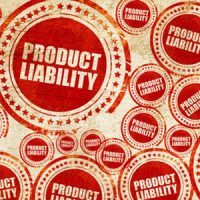Incomplete and Missing Product Labels: A Failure to Warn

Have you ever noticed how many instruction labels are on products or items that we use in our daily lives? Some make sense—like instructions telling us when to use and not use prescription drugs. Others seem a little comical, like labels telling us not to eat what clearly are inedible items.
But those items are there for a reason—and when they are not there, or they are incomplete or inaccurate, the maker or manufacturer of the product can be strictly liable to anybody that may be injured using the product.
Why are Labels and Directions Needed?
Think of a product that we all know and use often—say, for example, Tylenol. If Tylenol never had a label on it with instructions on how much can safely be taken at one time, would you know how much you can take at one time? How much can safely be taken in a day? You may not know—or you may have a general idea—but you could never truly be certain.
Many prescription drugs are known to cause, or exacerbate, mental illness ,like depression. Could you imagine someone with depression taking medicine and getting more and more depressed, into a spiral of hopelessness, and never having any idea that the root cause of the problem is a prescription medicine that person was taking?
Unknown Dangers
Some drugs have side effects you wouldn’t even expect. Prescription drug Ambien, used for sleep disorders, was sued because it did not disclose that people could, while on Ambien, get behind the wheel of a car and drive while essentially sleeping (as well as do other things, like eat).
Did you know that mixing bleach with chlorine in it and ammonia can be deadly? You may not have known that; some people didn’t, and died. That’s why these items carry warning labels advising against mixing these two commonly used cleaning products.
Bad Labeling is a Defective Product
Labels tell us things that the maker or manufacture knows but which we, as consumers, could not ever know. Which is why labels have to be accurate, and complete.
A product with a defective or incomplete label, is the same as a product which is, by itself, defective. There is no difference, and the law treats them the same way as well. Defective products include manufacturing defects, design defects, and labeling defects, and all carry with them strict liability.
Strict liability means that an injured victim need not show that the maker did anything wrong, or that the maker should have known that a product was defective or dangerous. All the victim needs to show is that the product was, in fact defective (or in this case, that the labeling was inaccurate or incomplete), and show that the defect caused the injury.
We can help you with your defective product lawsuit. Call the Knoxville personal injury attorneys at Fox Farley Willis & Burnette, PLLC, today for help with your personal injury case.
Sources:
corporate.findlaw.com/litigation-disputes/legally-adequate-warning-labels-a-conundrum-for-every.html
fda.gov/drugs/drug-safety-and-availability/fda-adds-boxed-warning-risk-serious-injuries-caused-sleepwalking-certain-prescription-insomnia











